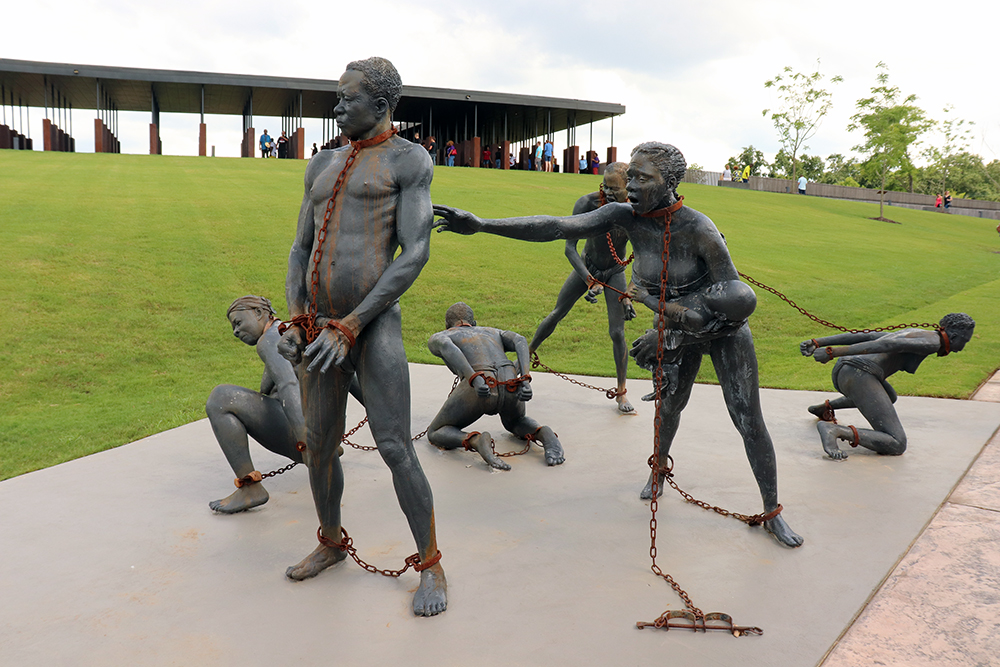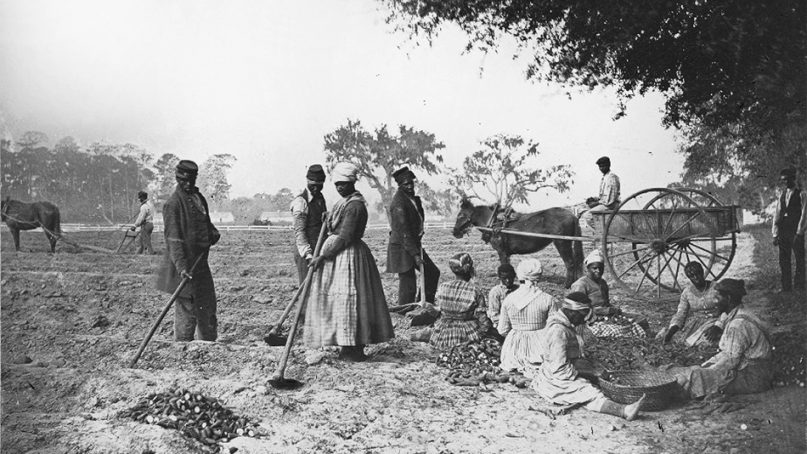(RNS) — In the years since the killing of George Floyd, it has felt at times as though anti-racism is stuck in a feedback loop. We shout the same truth claims to burned-out supporters and entrenched opposers. Is it still really necessary, I ask myself, to repeat the A-B-C’s of social justice?
Apparently it is. We’re not done covering the basics of anti-racism in America. Even some Black people are confused.
“Where would you be today without slavery?” Kim Klacik, a Black woman and former Maryland Republican congressional candidate, asked talk show host Marc Lamont Hill in a recent interview on theGrio.com.
In response, Hill, a Temple University professor, said the question ignores the fact that many Africans had thriving societies of their own. Second, he pointed out that Klacik’s question implies that Black people are collectively better off for having been enslaved.
The conversation degenerates from there, with Klacik mindbendingly claiming that trouble spots in Africa today give a picture of what life would be like for the African diaspora if slavers had not claimed them.

Host Marc Lamont Hill, left, and Kim Klacik during an interview on TheGrio.com. Video screen grab
So let’s review: The primary benefactors of slavery are white people. Period.
It is an irrefutable fact of history that the West was built on slave labor. Our ancestors were brought to the so-called New World to work, and their labor produced lucrative commodities such as tobacco, sugar, coffee, tea and rum that helped these nations grow wealthy. The enslaved built infrastructure: universities, churches, railroads and even the White House itself.
That past is the story of how we got to the present. If you can celebrate the fact that Thomas Jefferson’s penning the Declaration of Independence in 1776 led to the creation of the United States, you can understand that the theft of trillions of dollars in labor from enslaved African captives led to the wealth gap between Black and white America to this day.
What wealth gap? According to the Federal Reserve, white America held $124.5 trillion in assets in 2022, while Black America held less than $8 trillion. Even accounting for the relative numbers of each group, the gap is real and inextricably linked to the trillions of dollars of wealth stolen in labor and resources from African-descended peoples and nations.
Monetary wealth is just one measure. Due to a combination of environmental racism, discrimination in health care, discrimination in criminal justice and a general anti-Black bias that leads to stress-related disease, researchers have been monitoring a fluctuating Black-white life-expectancy gap for years. According to numerous studies, white Americans generally live longer than their Black counterparts.
JAMA, a respected medical journal, reported that the unequal structure of American society is responsible for the phenomenon known as “excess death” in Black communities:
That includes access to quality schools, jobs with a living wage, housing in safe neighborhoods, health insurance and medical care — all of which affect health and well-being. For centuries, Black people were legally deprived of these benefits, and researchers said we have yet to fully remediate the effects.

An art installation of slaves at the National Memorial for Peace and Justice by artist Kwame Akoto-Bamfo in Montgomery, Alabama. RNS photo by Adelle M. Banks
The advantages for white people extend to the intangible. Every year, the white nations who participated in the Atlantic slave trade are overrepresented among the top 20 countries in the World Happiness Index — probably because colonization left the colonizers’ descendants with greater access to means for well-being. In every nation their predecessors built through slave labor, they own most of the land and businesses.
The well-being gap seems to be directly related to racial difference. A Brookings study showed that Black and Asian Americans experienced sharp declines in well-being in 2016 and 2020 respectively — both years in which overt anti-Black and anti-Asian racism in the U.S. increased. That same study reports:
Since 2020, all racial and ethnic groups experienced a sharp drop in the percentage of adults thriving, consistent with the Gallup World Poll summary data. Asian-Americans saw the sharpest decline, which aligns with the rise in anti-Asian hate. During this period, non-Hispanic white Americans registered the highest rates of thriving.
Is it any wonder? Slavery left white people the psychological boon of presumed racial superiority, abetted by a galling, incurious innocence.
That innocence and incuriosity has penetrated even to Klacik, as she betrays in her chat on TheGrio with Hill, who is at pains to acquaint her with the idea that white colonialism had some part in African nations’ status today.
After the Atlantic slave trade was abolished, Europeans set their sights on dominating Africa, exploiting the continent well into the 20th century, enriching itself by extracting African resources and oppressing African peoples for centuries. With the exception of Ethiopia, the African continent was subjected to oppressive white rule, and the countries Europeans largely created are still dealing with the economic, cultural and political ramifications today.
“In country after country we see white men building empires on the sweat and suffering of colored people,” boomed Martin Luther King Jr. in 1967.
Are we better off? Do Black people enjoy to some degree the benefits of Western civilization? Perhaps, but they came with untold amounts of unnecessary violence, from which we haven’t recovered yet.






